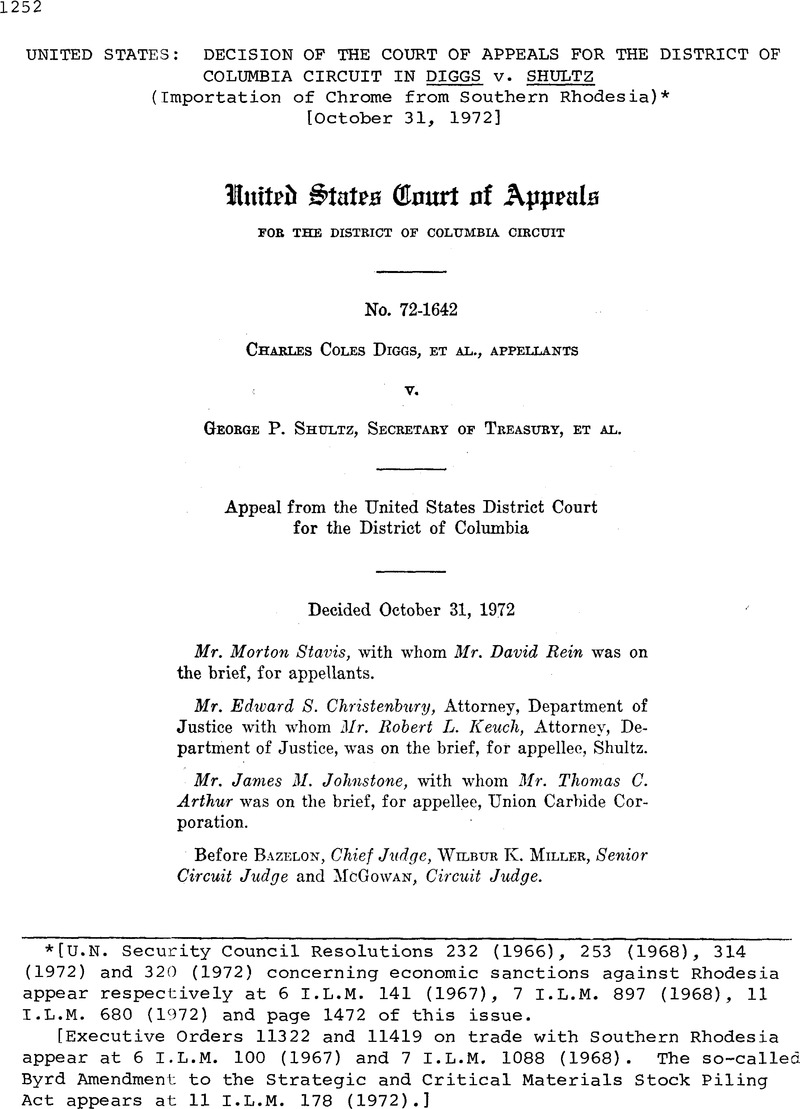No CrossRef data available.
Published online by Cambridge University Press: 04 April 2017

[U.N. Security Council Resolutions 232 (1966), 253 (1968), 314 (1972) and 320 (1972) concerning economic sanctions against Rhodesia appear respectively at 6 I.L.M. 141 (1967), 7 I.L.M. 897 (1968), 11 I.L.M. 680 (1972) and page 1472 of this issue.
[Executive Orders 11322 and 11419 on trade with Southern Rhodesia appear at 6 I.L.M. 100 (1967) and 7 I.L.M. 1088 (1968). The so-called Byrd Amendment to the Strategic and Critical Materials Stock Piling Act appears at 11 I.L.M. 178 (1972).]
1 We adopt the District Court’s identification of those plain-tiffs who meet the injury in fact requirement. Appellants M’Gabe and Zimbabive complain they are unable to return to their homeland, Rhodesia. Appellants Diggs, Conyers, Rangel, Stokes and Franck all alleged that they have been refused entry into Rhodesia; and the American Committee on Africa complains that its chairman has also been denied entry. The Council for Christian Social Action of the United Church of Christ alleges its missionaries have been arrested and deported from Rhodesia. Appellant Vidal asserts injury because sale of one of his books is banned in Rhodesia. None of the other plaintiffs have standing; and it is not contended in this court that they have.
2 It is far from clear that this formulation adds anything of substance to the two requirements just discussed. It states a proposition that can well be thought to be related to the merits of a claim rather than to the existence of standing to press it. The District Court, with some support in Supreme Court language, chose to pursue the question as an aspect of standing, although the rationale followed by it is relevant to its dismissal for failure to state a claim warranting relief.
3 The passage of the Byrd Amendment was the subject of widespread notice and comment within the United Nations, resulting in the reaffirmation by the Security Council on February 8, 1972 of the sanctions against Southern Rhodesia. The resolution to this end declared that any legislation passed by any member state “with a view to permitting, directly or indirectly, the importation from Southern Rhodesia of any commodity falling within the scope of the obligations imposed (by the 1968 resolution), including chrome ore, would under-mine sanctions and would be contrary to the obligations of States.”
4 Moser v. United States, 341 U.S. 41, 45 (1951) ; Clark v. Allen, 331 U.S. 503, 508-9 (1947) ; Pigeon River Co. v. Cox, 291 U.S. 138, 160 (1934) ; Edge v. Robertson, 112 U.S. 580, 597 (1884).
Although appellants concede that Congress has the power to override treaty obligations (Appellants’ Br. at 23), they contend that our commitment to the U.N. has more force than an ordinary treaty. Appellants argue on the basis of their interpretation of the U.N. Charter that Congress could override Resolution 232 only by withdrawing from the U.N. entirely. There is, however, no evidence that this country’s membership in that organization was intended to be on the all-or-nothing basis suggested by appellants.
5 Russia supplied 60 per cent of our metallurgical chromite in 1970 while the embargo was being observed by the United States, S. Rep. No. 92-359, 92d Cong., 1st Sess., 121 (1971), and a decision to discontinue importation would be a serious step in a very delicate area. Similarly, the decision to remove certain materials from the critical and strategic list should be done in a manner consistent with the objectives of that act. 50 U.S.C. § 98. Appellants’ view would require reclassification of materials without regard to whether they continue to be critical to national defense. Appellants argue that the apparent surplus in the stockpile indicates the materials are no longer critical. This confuses two distinct functions under the act. One is classification of materials as strategic or critical in order to encourage their development in this country and to avoid dangerous dependency upon other nations. The other is the acquisition of certain quantities of these materials to be stockpiled for use in an emergency. A surplus in the stock pile at a given moment does not mean that it is no longer necessary to be concerned about the dependency of this country on outside sources for the materials in question.
8 The Supreme Court in Baker v. Carr was at pains to point out that the so-called “political question doctrine” is an aspect of the separation of powers prescribed by the Federal Constitution; and that, in the intra-federal context, it continues to have meaningful vitality to restrain interference by one branch of the federal establishment with concerns committed to another. The case before us is a classic one for the careful appraisal by a court of the consequences of an exercise of jurisdiction it may technically be thought to have.